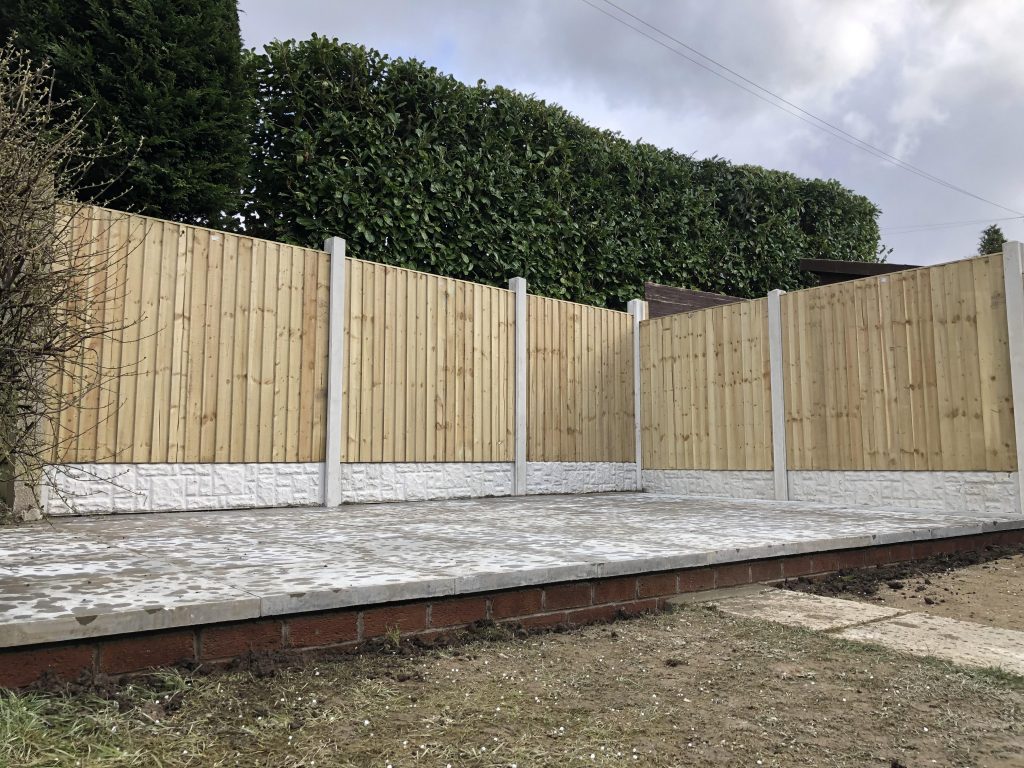E-Mail: elliot@ecpbuildinglandscaping.co.uk TEL: 01254 806769
Garden Fences Made (Even) Simpler: What You Need To Know
Fencing, fencing, fencing. That is the subject of today’s brief guide. More specifically, and unsurprisingly, the kind which secures the perimeter of your property- not the Olympic sport.
I simply can’t pretend it’s quite as exciting but, as a homeowner, the humble fence has a vital role to play in defining and protecting your outdoor space. We’ve seen our fair share of gardens and one of the first things we notice is the quality (or lack thereof) a garden fence. We firmly believe that in the 21st century there is no reason to accept a wonky, wobbly or ugly fence. A quality solution can be delivered at all price points.
Why renew your garden fence
Thoroughly establishing client requirements is at the heart of our process. The exact ‘why’ always varies but common drivers when it comes to fencing include wanting to increase security, privacy and aesthetic appeal.
It didn’t surprise us to learn that in a nation of avid gardeners, a well-maintained garden has the potential to increase property value by up to 20%. A sturdy garden fence is a major component of this and often benefits the neighbouring property. This is why if you are considering work on your boundary it’s important and potentially mutually beneficial to get your neighbour involved.
This has the potential to be a sensitive issue where disputes are all too common. So when working on fences where access from a neighbouring property is vital we think it is best practice to build a good relationship with all parties and exercise exemplary levels of consideration.
How to get your garden fence installed
Fortunately, the vast world of fencing provides us with a plethora of options to meet all possible specifications. Indeed, there are far too many to properly explore each one in this article so, instead, let’s explore some common solutions.
Timber/Concrete Fencing
We simply can’t get started without mentioning the concrete post wooden board fencing- ubiquitous across housing estates nationwide. Recently, this has fallen out of favour as a result of changing aesthetic tastes. But for us, there is a charm to it’s utilitarian construction which is highly resistant to degradation from ground based moisture. Concrete posts simply don’t rot. This robust nature in combination with cost-effective installation makes it a favourite among landlords looking for a multi-decade solution.

Above: a concrete board, wooden post fence installed for a client in the highmoor area. Access was tight so the large prefabricated elements proved challenging to manoeuvre. This was more than made up for by how much installation time it saved.
Recently, the all-timber fence has gained favour for its consistent visuals and contemporary aesthetic becoming a favourite of our clients pursuing sleek garden makeovers. To get a grasp of what is possible, we recommend getting in touch with local timber merchants such as Ribble Valley based Empress Fencing.
Alternatively, the national chain Travis and Perkins with an outlet in Clitheroe has an extensive online catalogue featuring such varied types as domed, ‘Kyoto’ and ‘Venetian’ panels. These can be purchased as is, or used as a basis for a bespoke solution tailored to achieve a particular finish.
However, there are obvious and valid concerns over degradation mechanisms such as rot and insect attack in timber-based fencing.
To combat this, we truly believe that proper groundwork, detailing and a coat of paint/stain really do make all the difference when it comes to durability. It is our opinion that neglect of these simple factors results in the majority of fence failures. This is particularly frustrating as it represents a relatively small financial investment.
Composites
Unlike timber, composites are inherently resistant to degradation by moisture and insect attack. We are familiar with composite materials through decking where this feature, as well as offering a stunning aesthetic variety, makes it an incredibly popular choice.
However, like concrete and unlike timber, composites are often less sustainable and more environmentally harmful. This is potentially not as bad as it initially sounds, as when spread over the long lifetime of the fence, the negative environmental impact becomes less significant. Nevertheless, this is a point worthy of consideration, but not usually a main factor for most clients.
Ecoscape UK has an interesting article on the subject composite fencing, which you can check out here.
Metal Railings and Garden Walls
In Clitheroe and the surrounding areas, we’re lucky to benefit from a stock of traditional vernacular architecture. In such properties, metal railings and limestone walls form a staple of their visual character worthy of proper care. Furthermore, living and working in this area, we understand that specification pertaining to aesthetic character is of critical importance to maintaining our cultural heritage and so such options are often the obvious and sympathetic choice.
Now what?
We wish you the best of luck with your fencing project! If you want to get a contractor involved, feel free to get in touch via our contact form or on 01200 374419 for a site visit and free estimate.
